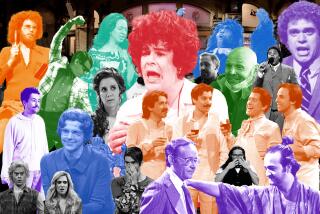Life’s rhythms pulse through Ojai festival
Folks here never tire of reminding visitors that Ojai is different, a small slice of paradise, not quite part of the real world. They could be right. But we must hope they are not.
For bees, mysteriously dying off elsewhere, still buzz throughout this beauteous valley; the community’s patron sage is J. Krishnamurti, who suggested that saving ourselves and our planet depends upon rational choice; and music, under the outline of the Topa Topa Mountains, matters deeply.
Over the weekend, for the 61st time, Ojai hosted its music festival. Rescuing the environment was not the theme. The extraordinary French pianist Pierre-Laurent Aimard was music director, and he focused all the concerts but one, Thursday through Sunday evening, on pianos and/or percussion. A larger theme, however, emerged, one in which humanity and nature, living and dying, were central.
Saturday started off with a morning recital by Aimard in the Libbey Bowl, the beloved outdoor festival site. It began with Schumann’s “Gesange der Fruhe” (Songs of Dawn) -- the composer’s last work for piano and practically unknown. Five short pieces take harmony into the future, let form be free and end in uncertainty. Aimard played them as bracing sounds for the fresh morning air.
Without pause he went into Bach’s last music, the final fugue from “Art of the Fugue,” which breaks off unfinished. Aimard did not let silence and our thoughts complete Bach’s but steamed ahead into the ninth fugue of the set, played with passion, absolute clarity and a rhythmic momentum that gave music the force of gravity.
Still not stopping, Aimard launched from Bach into two pieces by Elliott Carter: first, “Intermittences,” music of stopping and starting, of silences broken, written in 2005, and then “Catenaires,” written late last year for Aimard and premiered at Carnegie Hall on Dec. 11 as a surprise encore on Carter’s 98th birthday.
This was but a 45-minute segment of a weekend packed with music. The big piece of the morning, yet to come, was Ives’ “Concord” Sonata, played with care but not quite enough messiness. The festival included the participation of the St. Paul Chamber Orchestra, boisterously conducted by Douglas Boyd. The Bugallo-Williams Piano Duo opened the proceedings Thursday night with a dazzling recital. Nexus, the long-lived Canadian percussion ensemble, was in residence. Peter Eotvos was guest composer and conductor.
Still, I think it fitting to dwell on those 45 minutes, because they represented the kernel of what constitutes Aimard’s growing popularity with audiences everywhere and of Ojai’s musical importance.
The playing was, first off, mesmerizing. Aimard’s lucidity and transparency make the most complex music feel within a listener’s grasp. The emphasis Saturday morning was on late style, on composers at the end of their lives, yet what one heard were sparks flying from dying embers ready to ignite new fires.
Nature intruded as well. Birds chirping, leaves rustling and those bees are happy accompaniment. Buzzing airplanes, yapping dogs, car alarms and motorcycles are not. But we must accept all noise. Aimard concentrated intently. And somehow all added to the notion that these dying embers were part of continuing life.
There were many highlights. Man and machine and nature all interacted in the Thursday duo piano recital of Helena Bugallo and Amy Williams. Stravinsky’s two-piano versions of his Septet and his “Dumbarton Oaks” Concerto began the evening with great glitter. It ended with Ligeti’s “Poeme Symphonique.” One hundred metronomes on nine tables surrounding the audience were set to tick for 20 minutes, their slow fading out like a life cycle ending.
Friday night was a piano and percussion fest. Bartok’s Sonata for Two Pianos and Percussion was followed by Eotvos’ post-Bartok “Sonata per Sei” for two pianos, sampler and percussion. All culminated in Stravinsky’s “Les Noces” for four pianos, percussion, four vocal soloists and chorus. Bartok’s abstraction, with its hint of folk music, became more elaborate in Eotvos’ score, as one Hungarian composer took over from another. Then folk music exploded in Stravinsky’s erotic evocation of a rustic Russian folk wedding. Aimard and Tamara Stefanovich were the gripping soloists in the Bartok and Eotvos; Bugallo and Williams joined in for “Les Noces,” which Eotvos conducted with a feeling of fire.
Saturday night was devoted to two Chinese fakes. Boyd led the excellent St. Paul ensemble in Eotvos’ “Chinese Opera,” which is neither Chinese nor an opera, and a chamber version of Mahler’s “Das Lied von der Erde,” which uses Chinese poetry and alludes to Chinese folk melodies. Eotvos copies Chinese opera sounds with a Western orchestra and a couple of gongs and succeeds.
The chamber version of “Das Lied” is a fake-out of a fake-out. Sketched by Schoenberg in 1920 but only realized by a German new music specialist, Rainer Riehn, it subverts Mahler’s Romantic orchestral sound, which had already subverted its Chinese sources. The result is jerky, difficult chamber music. Orchestra, tenor (Sean Panikkar) and mezzo-soprano (Monica Groop) all struggled.
But the ending, the long song “Der Abschied” (The Farewell), was enchanted. Groop found her center. Mahler made into chamber music sounded especially death-haunted but also close to Schoenberg and his school.
Sunday’s finale was a feast of piano concertos. Aimard played and conducted Mozart (Concerto No. 8) and was soloist in Ligeti’s Piano Concerto (with Boyd conducting). Aimard conducted Carter’s recent Dialogues for Piano and Large Ensemble, with Stefanovich as soloist. And Aimard was again at the keyboard for Ravel’s Concerto in G, with Boyd again on the podium.
Among these four memorable performances, what stood out most were Aimard’s conducting and his magical playing of Ravel. One hesitates to encourage him to take time from the piano to conduct. But in the Mozart (a tame, immature score) and the Carter (a vital mixing up of piano and orchestra), Aimard got exceptional results.
Next year David Robertson will be music director, Dawn Upshaw the featured soloist.
More to Read
The biggest entertainment stories
Get our big stories about Hollywood, film, television, music, arts, culture and more right in your inbox as soon as they publish.
You may occasionally receive promotional content from the Los Angeles Times.











